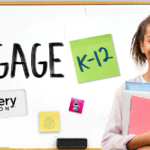By Dessie Bowling, KVEC Associate & Robert Brown, KVEC Policy Lead
The Kentucky Valley Educational Cooperative (KVEC) is a non-profit 501c3 educational service agency established in 1969 by 8 small school districts coming together to share resources. We currently serve 23 districts, 140 schools, and over 50,000 students in rural eastern Kentucky. The districts we serve border Ohio, Virginia, West Virginia and Tennessee.
KVEC districts are located in some of the most distressed counties in America in terms of poverty, education and employment. We house a comprehensive Special Education Cooperative, the state’s second largest Reading Recovery site, and an array of content specific projects and initiatives to build the human capital of educators, learners and community members.
Our staff of passionate educators focus on teaching, leadership and learning and working together with school communities to improve the quality of life for people in Appalachia. Being roughly the size of Connecticut in square miles, access to professional learning can be a challenge when budgets are tight or eliminated.
As we strive to ensure high quality learning experiences and equity for all learners, leadership at KVEC continually work to create opportunities for learners through multiple modalities as we push forward to see what’s around the next curve in the road. When someone says, “we can’t do this,” we ask, “why can’t we?”
Recognizing that teachers are preparing diverse students for success in a global economy and that our geographic isolation can be a barrier, KVEC invested in a virtual reality/motion capture suite that allows educators and students to step into a world filled with virtual learning explorations and interactive personal professional learning experiences.
Through our online social learning platform, The Holler (www.theholler.org), students and teachers create videos to model work taking place in classrooms across our region. This online social learning network is designed for digital place-based multimedia implementation where videos are created documenting ‘what is possible’ and shared through a simple web app to audiences in 23 rural eastern Kentucky school districts. Articles, content, and social-sharing are created using place-based guided discovery multimedia strategies to generate original ideas and project creation within rural Appalachian classrooms.
The following are some resources used on theholler.org:
Digital Storytelling
Generate engaging content that tells a story, not just a list of information; promote compelling practices and fundamentally sound learning and should not feel like a marketing campaign;
Multimedia
Leverage all media at our disposal: podcasts, both live and edited video, photo essays, graphics, etc.;
KVEC Stories
Connect KVEC press releases to all districts and broader themes in education; we are recognized as a national leader in innovation education;
Community Media
Content from KVEC and the Holler but created by people within the community to document innovative practices within rural communities;
Social Multimedia
Users post their own photos, audio and video to tell the story about their own communities and what it is that makes them great places to live and work;
Social Data
Users share documents and links from their own daily work or research interest to engage colleagues and community members in discussion around the shared information;
Social Interaction
Users share and talk across district and geographical barriers – hearing from micro communities and breaking down traditional barriers;
Social Collaboration
Users collaborate with one another or a larger group through extended discussion and team projects. May start with KVEC programs but can extend to new working groups as defined by the user community.
Small town, rural community life isn’t for everyone
Many rural areas across the nation, much like KVEC, continue to have difficulty finding and retaining certified teachers. Connecting with colleagues, limited professional learning opportunities and peer interaction have been identified as potential barriers to locating in a small town.

KVEC has worked to assist the districts we serve. We knew what professional learning should look in order to build educator capacity and improve learning for students. We believed educators need personalized professional learning opportunities that allowed them to network with their colleagues across the region and increase their expertise specific to their area of need. Based on the need for research based, job-embedded competency- based learning, KVEC embarked on promoting and developing micro-credentials to meet professional learning challenges in the Appalachian Region.
Through The Holler educators were already accessing information and resources, learning from experts, and networking with each other and we knew it would be the platform to engage educators in developing and completing micro-credentials.
KVEC leadership had been working with Digital Promise (authorized by Congress in 2011 and created with the mission to accelerate innovation in education to improve opportunities to learn) for several years and had been identified by them as the first ever Education Innovation Hub. Digital Promise was contracted to assist KVEC staff with developing and vetting micro-credentials which educators could earn around work currently underway with facilitative coaching, mentoring, and networks. Getting all this in place, KVEC began to pursue a more targeted approach to individual personalized professional learning and micro-credentials.
Micro-credentials are a digital form of professional learning indicating that a person has demonstrated competency in a specific skill, such as data literacy, teacher leadership, or growth mindset. They are competency-based, personalized, on-demand, and shareable.
Rather than learning by watching, reading, or listening alone, micro-credentials promote learning by doing. In many fields such a medicine or technology, clinical experiences are incorporated into the learning. Micro-credentials bring clinical experiences into the classroom. At some traditional sit and get professional development sessions, often the learning becomes “that is great to know…but” with little or no follow up. Some educators also find themselves in sessions that may not apply to their specific needs.
Micro-credentialing addresses both those concerns
They require learning, implementation, reflection, data analysis, and assessment as common practice for learning. In many cases, the micro-credentials are free or have a minimal assessment fee ($25 – $50). This makes them much more economical for districts where educators must travel long distances for professional development resulting in travel reimbursements, hotel stays, meals, etc. Micro-credentials are completed online at home or during school hours as part of professional networking time.
Educators apply their learning in their practice and collect evidence, thereby demonstrating their competence. Once successfully completed, the educator receives a badge. This badge identifies specific competencies educators have demonstrated in a rich professional learning environment based on needs of students, educators, and schools (purpose driven). These badges can be shared on social media sites and placed in digital portfolios. The employer is getting an educator with skills they can use to improve learning outcomes for students and readily identify those who can be teacher leaders for their buildings.
KVEC uses micro-credentials in various ways to develop professionalized learning systems within our schools. Through our Activating Catalytic Transformation Initiative, educators (with principals and central office) must identify problems of practice and create theories of action to address those issue.
Our micro-credential, Framing a Problem of Practice, requires administrators and teachers to work together and analyze multiple sources of data specific to their own school and determine a problem that is keeping them from performing at a higher level. The data review allows them to get beyond seeing the symptoms and dig deeper to uncover the real problem of those symptoms. Administrators and teachers then individually create professional action plans on what each person can do to address that issue. After identifying the problem and setting goals, each person identifies their contribution to reaching the goals. When professional learning is needed, micro-credentials can provide the just-in-time learning the teacher/administrator needs.
We also use the micro-credentials to fill in identified learning gaps. Many teachers identified needing assistance in developing learning plans and strategies to meet the various needs of students. Based on the work of Jim Knight, educators working with KVEC staff created an Instructional Checklist micro-credential to help teachers organize and use effective strategies. Teachers have also identified needing assistance with strategies to teach diverse learning populations and we have worked to bring together multiple educators to address specific topics and develop micro-credentials that provide deeper learning experiences.
We currently have the following published or in development:
Seven (7) on the Digital Promise website: Micro-credentials.digitalpromise.org
- Assessment Literacy
- Collaborative Coaching
- Developing an Instructional Strategies checklist
- Framing a Problem of Practice
- Facilitating Online Computer Science Learning
Teaching Rural Students from Poverty
- Building Relationships
- Understanding Types of Poverty
Twelve (12) draft micro-credentials have been submitted based on the work of KVEC’s “Special Education Micro-Credential Collaborative” with strategies for working with differently able learners
- Adapting Mathematics Lessons for Students with Disabilities
- Developing Leadership Opportunities for Students with Disabilities
- Effective Collaboration Practices: General Education, Paraprofessionals, Related Service Personnel, Special Education Teacher, Family and Caregivers
- Methods of Measurement, specific to Curriculum Based Measurement
- Using Direct Measures for IEP Progress Monitoring
- Coaching Teachers with Actional Feedback
- Question Formulation Technique
- Visual Scheduling
- Co-Teaching between the Special Education and Regular Education Teacher
Continuing our work with the educator experts in our region allows KVEC to create personalized professional learning opportunities that meets the professional learning needs of teachers; and, creates multiple opportunities for a more engaging learning environment for students. All learners are individuals and must be provided equitable opportunities for learning experiences that enable them to successful both academically and socially. To learn more about our remote learning initiatives, readers can create accounts at www.theholler.org and view our many Hollers, news stories and videos. We will holler at you later!
If you would like more information or to discuss a strategy, email:
- Dr. Dessie Bowling, KVEC Associate | Dessie.bowling@hazard.kyschools.us
- Director Mr. Robert Brown, KVEC Policy Lead | Robert.brown@hazard.kyschools.us
The American Consortium for Equity in Education, publisher of the "Equity & Access" journal, celebrates and connects the educators, associations, community partners and industry leaders who are working to solve problems and create a more equitable environment for historically underserved pre K-12 students throughout the United States.
- American Consortium for Equity in Educationhttps://ace-ed.org/author/admin/
- American Consortium for Equity in Educationhttps://ace-ed.org/author/admin/April 23, 2025
- American Consortium for Equity in Educationhttps://ace-ed.org/author/admin/
- American Consortium for Equity in Educationhttps://ace-ed.org/author/admin/








